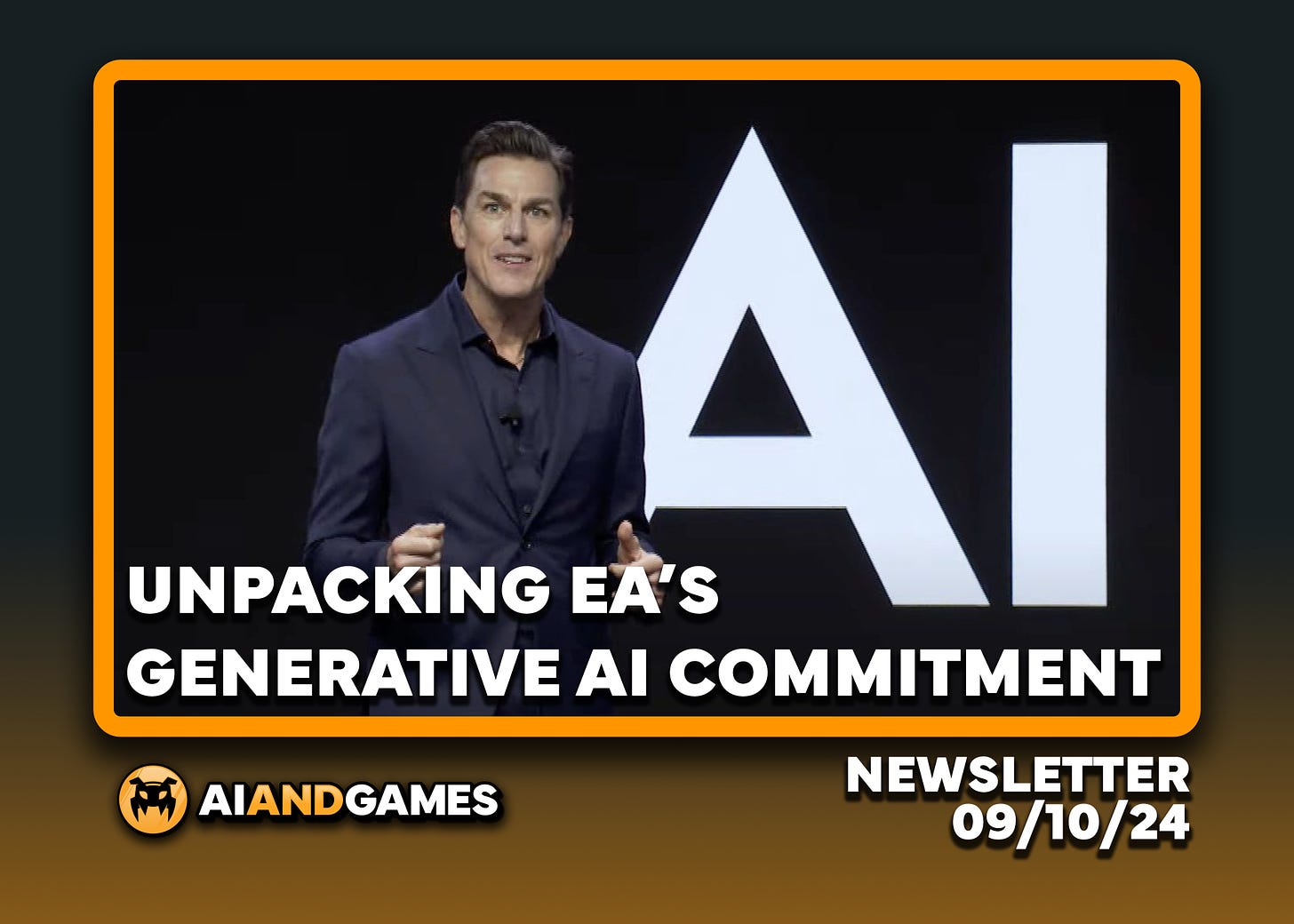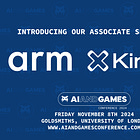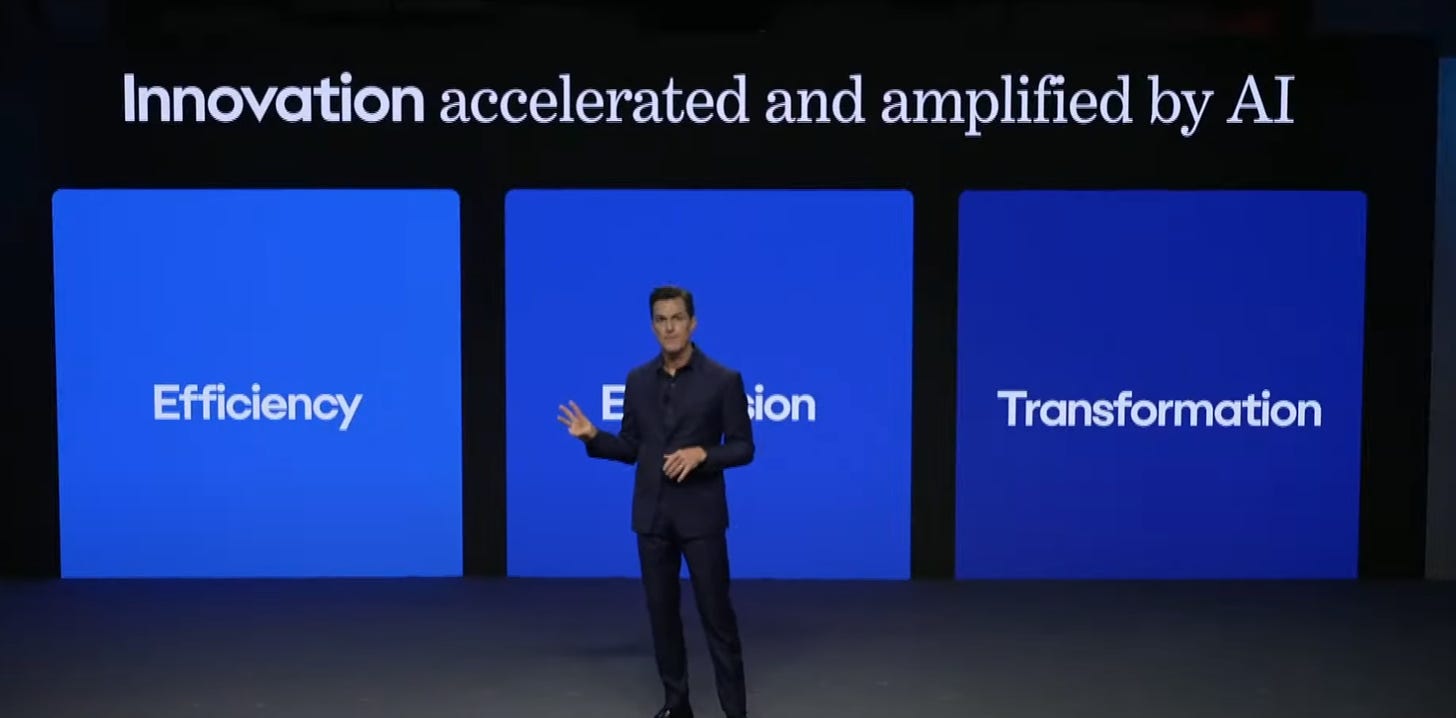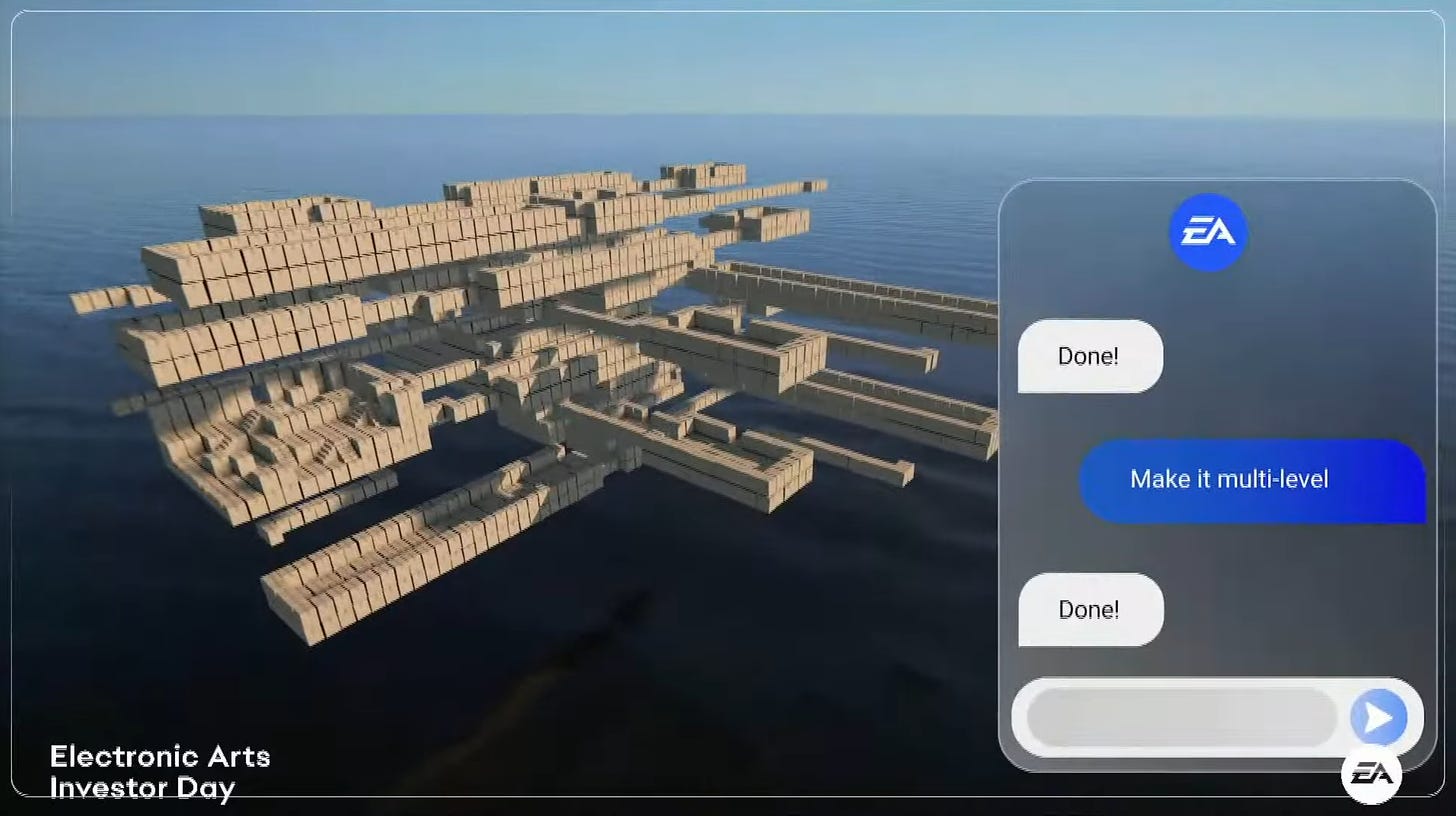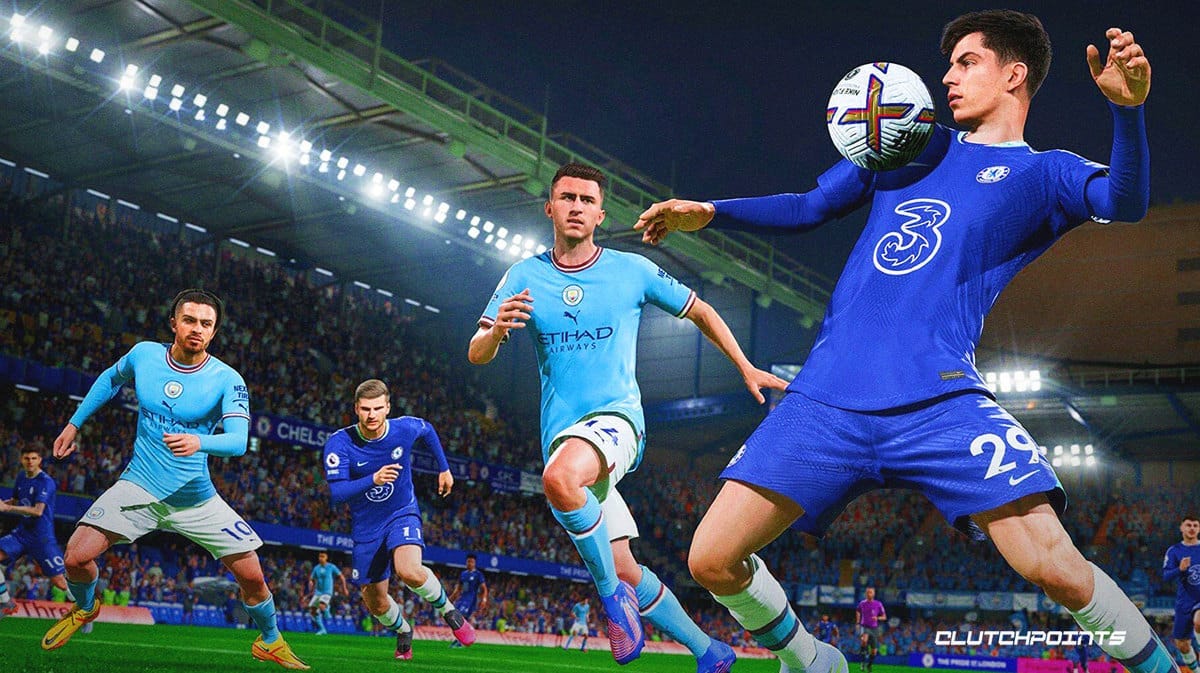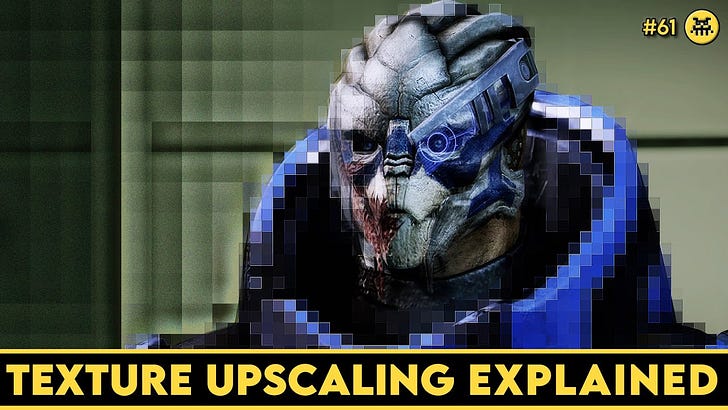Unpacking EA's Generative AI Commitment | AI and Games Newsletter 09/10/24
Plus an Alien Isolation retrospective and more conference updates!
The AI and Games Newsletter brings concise and informative discussion on artificial intelligence for video games each and every week. Plus summarising all of our content released across various channels, from YouTube videos to episodes of our podcast ‘Branching Factor’ and in-person events like the AI and Games Conference.
You can subscribe to and support AI and Games on Substack, with weekly editions appearing in your inbox. The newsletter is also shared with our audience on LinkedIn. If you’d like to sponsor this newsletter, and get your name in front of our audience of over 6000 readers, please visit our sponsorship enquiries page.
Hello all, welcome back to the
newsletter. here as we dig into the wonderful world of artificial intelligence for video games, and boy do we have a meaty topic to get into this week.I have to say, it’s difficult to keep on top of this space sometimes. So much is happening so fast, and I want to provide something meaningful in your inbox that helps you get to grips with what’s going on. So y’know, sometimes, I just want a quiet week. Just a single week without a bonkers headline crossing my path so I can get on with both short and long-term planning for AI and Games across both Substack and YouTube.
But no, Electronic Arts were desperate to suck all the oxygen out of the room with their recent moves to orient themselves as the new big AI hotness. I resisted the urge to talk about this in the last issue, because I really wanted to get my deep dive into the SAG-AFTRA onto the front page.
And so with that done, dusted, and published: EA, you have my undivided attention.
Announcements
Before we get to the usual announcements, it’s time to announce an upcoming video project. A retrospective on what is undoubtedly the most popular topic from my YouTube work over the years: the AI behind Creative Assembly’s Alien: Isolation.
In the retrospective I sit down and interview numerous people to talk about this seminal horror title which just turned 10 years old on October 7th. I chat not just with people who worked on the game, but also with other people around the games industry who have strong connections to it. This video is still in development - meaning I am still interviewing people for it - and you can expect to see it in the coming months.
And of course, Creative Assembly celebrated the 10 year anniversary by announcing a sequel is in the works. So yeah, I have a sneaking suspicion this won’t be the last time I’m talking about this franchise on YouTube.
AI and Games Conference 2024
Some big updates happening in and around the AI and Games Conference, running in less than a months time! The schedule is close to final, and we have some fantastic speakers and talks coming your way!
To find out more, head to the article I launched yesterday on AI and Games in which I welcome Arm and Kinetix as Associate Sponsors, plus go into a little bit of detail on the agenda as I introduce a stack of speakers and talks. We’re very excited about what’s to come, and I can’t wait to kick things off in London next month.
Other Announcements
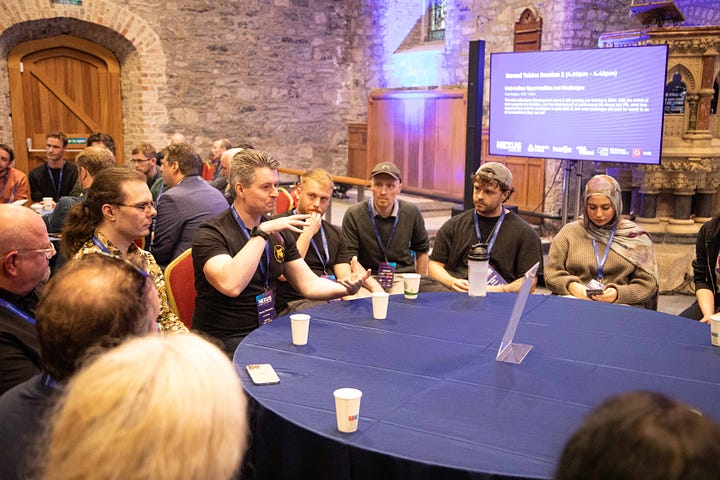
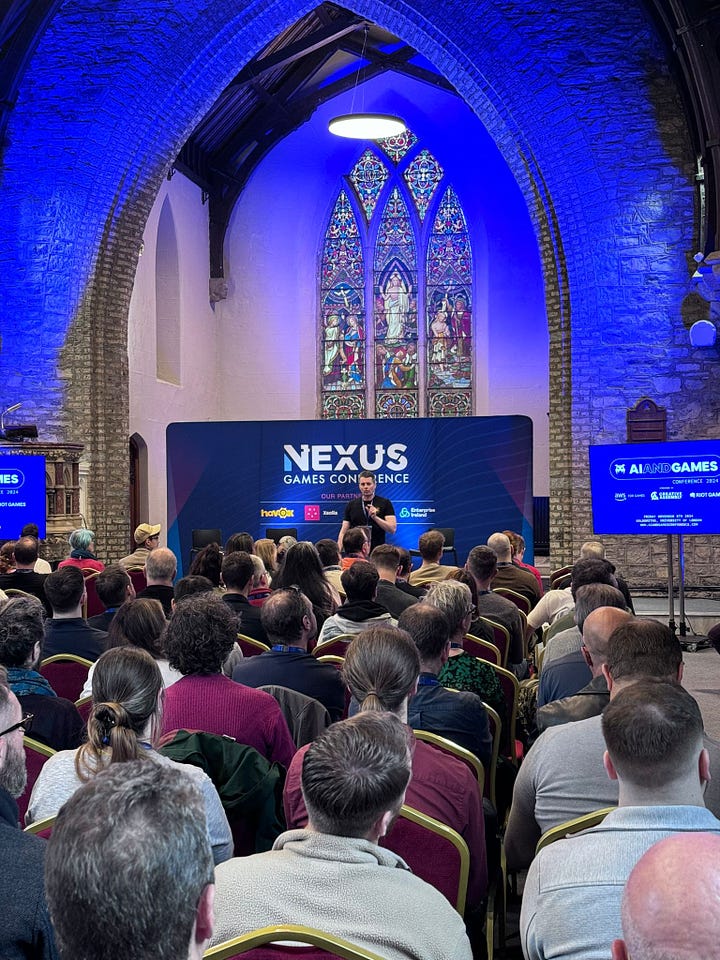
The last issue of the newsletter went live while I was at the NEXUS Games Conference in Dublin, Ireland, and I want to take a moment to thank the organisers and attendees again for a wonderful event. It’s not often you’re invited to participate in a games industry event in a decommissioned church. What a venue!
Today, this issue goes live as I am hosting a ‘Large Language Models for Game Designers’ training course in Lyon working with Gamaste. Note to self: take a photo or two of the day to share in the next issue.
In the meantime, there are still a stack of fun game/AI events happening in the coming weeks.
Next Level 2024, King’s College London, UK, October 25th.
Konsoll 2024, Grieghallen, Bergen, Norway, October 31st and November 1st
AI and Games Conference 2024, Goldsmiths, University of London, UK, November 8th.
The Big Story: Unpacking EA’s Generative AI Commitment
Today I’m foregoing the news and jumping straight into our big story - which is code for ‘I had to write up that other post about the conference and that meant I’m finishing this piece while travelling’. A couple weeks back Electronic Arts made their play to showcase their commitment to generative AI for game development. An effort that, in my opinion, would have performed much better if they had focussed on the great things that EA does in AI for games, rather than a lot of R&D and speculative ideation that was not ready for public consumption.
The 2024 EA Investor Day was hosted out in New York City on September 17th 2024, and as always is intended to help showcase the companies overall agenda across the fiscal year. This provides an opportunity for EA to highlight specific products such as the next entry of Dragon Age, the upcoming Skate reboot, a commitment towards supporting The Sims 4 rather than building a new entry in the series, the next entry of the Star Wars: Jedi series, as well as the ongoing evolution of the Battlefield franchise. But really it’s not about players and the end consumers of the product, this is aimed at investors: the people with the financial collateral to support the company to help grow its financial base, and support development or larger and more ambitious projects.
Buzzword Bingo
It took all of 15 minutes into the introduction by EA’s CEO Andrew Wilson before the phrase ‘AI’ was uttered. In fact, as Wilson worked through his prepared speech, he stated the following:
“This pursuit of innovation has led our games to be at the forefront of the technology curve. AI in its different forms has always been central to this creative journey. We all remember playing against the AI, and it has evolved into today’s innovation in generative AI. This remarkable technology is not merely a buzzword for us, it’s the very core of our business.” [Andrew Wilson]
The rest of his speech was, to the speechwriters credit, something of an accurate reflection of how EA uses their AI tools around their productions. To give some context: Electronic Arts has been and continues to be at the forefront of a lot of AI developments in the sector, both courtesy of their R&D unit EA SEED, but also a lot of projects happening across their games studios.
As shown in the screenshot above, Wilson sought to highlight how AI impacts their work in three key areas: efficiency, expansion, and transformation. And again to the scriptwriters credit, when they highlighted what these tools facilitate in the development process, they did a good job with the first half. It helps with efficiency, in minimising time spent on complex tasks and supporting quality assurance. Though the discussion in the ‘expansion’ segment used very colourful language with no substance. It seems that communicating the work happening across EA to facilitate content creation and facilitate pipelines and processes was difficult to explain - from my perspective the Efficiency and Expansion Venn diagram had some serious overlap.
When we got to ‘Transformation’, things went a little off-piste:
For years we have talked about how games deliver experiences that are always new and different. We predict that with generative AI that we can fulfil this promise for billions of people for billions and billions of hours.
What followed from Wilson was a highly speculative discussion of the potential of generative AI in games. But this quote cements the companies vision of what generative AI would enable them to achieve. The majority of EA’s revenue doesn’t come from one-off software purchases of the likes of EA Sports FC or the latest Star Wars title, it’s in repeat monetisation of their playerbase. Ultimate Team modes in EA Sports FC and Madden have historically lead to billions of revenue as it keeps players locked into those ecosystems, and gives them continued reason to invest in those platforms.
The key phrase in that quote is “billions of people”. EA doesn’t have that level of userbase. Their games sell well, very well in fact, but they do not cater to billions of players. The C-Suite at EA believe that by leveraging generative AI it will broaden the appeal of their games, and make them more financially lucrative through microtransactions and similar monetisation practices.
Later in the day Mihir Vaidya, EA’s Chief Strategy Officer, gave a longer breakdown on the viability of generative AI. Vaidya gave a broader overview of the Efficiency/Expansion/Transformation concept, complete with two demonstrations. The first a map generation demo where an arena of cardboard boxes is placed in what appears to be the Battlefield engine, and then a digital clone of EA Sports FC 25’s cover star Jude Bellingham talking to the audience..
Each demo was pretty lacklustre and clearly fabricated. Now I know that EA are investigating this technology across various sites (it was stated there are over 100 AI projects happening at EA right now), and I suspect that in each instance there is a version of each demo that works, but at no point was I even remotely convinced that either shown here was complete or accurate. Plus, the Bellingham demo was pre-recorded and not a live interaction; thus opening the question of whether they didn’t just ask the fella to come in and record the lines when he was last in the office.
Arguably the one part of the day that seemed close to practical was that highlighted by Laura Miele, president of EA entertainment, technology, and central development. This segment focussed on The Sims Hub, a new suite of tools that will come to the The Sims 4 (though it’s argued this will be a cross-platform tool that connects to multiple Sims titles in the future). This included ideas such as training generative models on their existing asset library for later use in these games, but also the ‘Script to Scene’ tool, which should empower designers and end-users to create entire scenarios courtesy of LLM’s, again with a nicely pre-recorded demo.
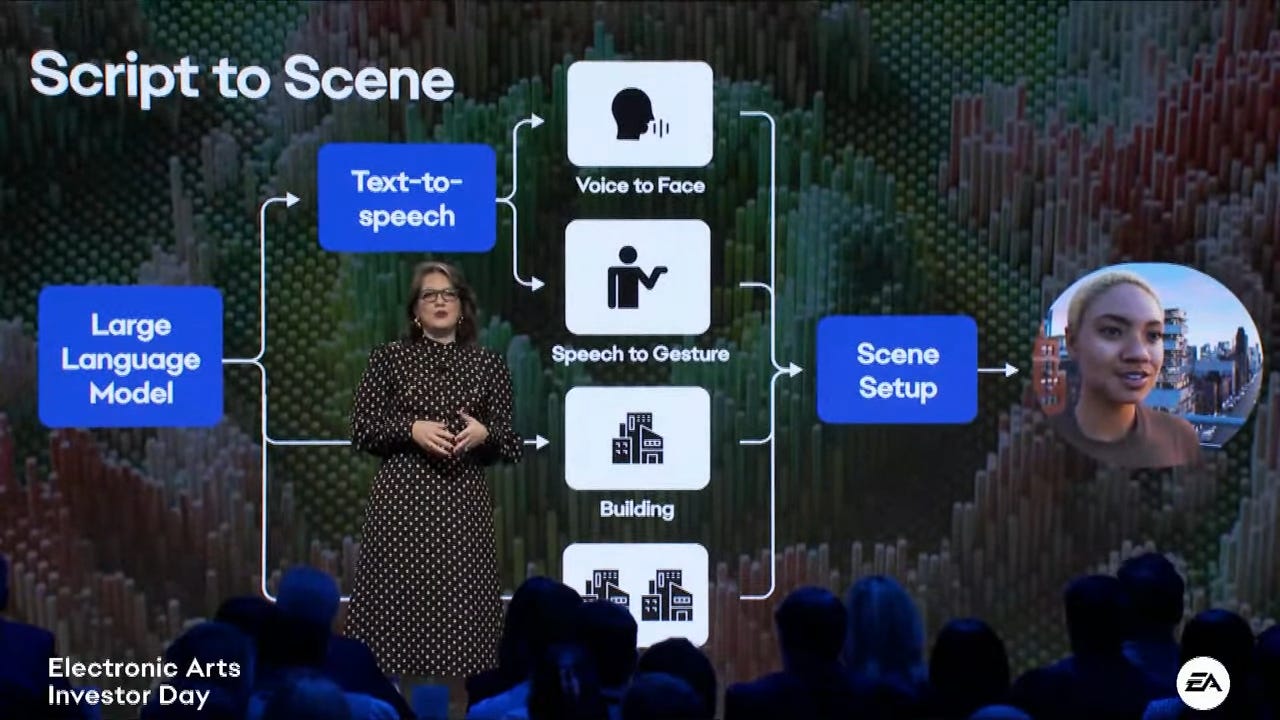
Reading the Room
Investor presentations can often be taken with a pinch of salt, and I can’t say that it surprised me that the reception across games media was largely negative. Personally I found it disappointing that a company that has the capacity to set the standard for this sort of thing didn’t recognise the opportunity in front of them.
Let me unpack that thought a little. As mentioned, EA is hugely invested in AI applications for their projects. Sure, I think Wilson’s comment of AI being at the “very core” of the business sounded incredibly tone-deaf, but I’d argue with anyone who says they’re not serious about AI research and development as a business.
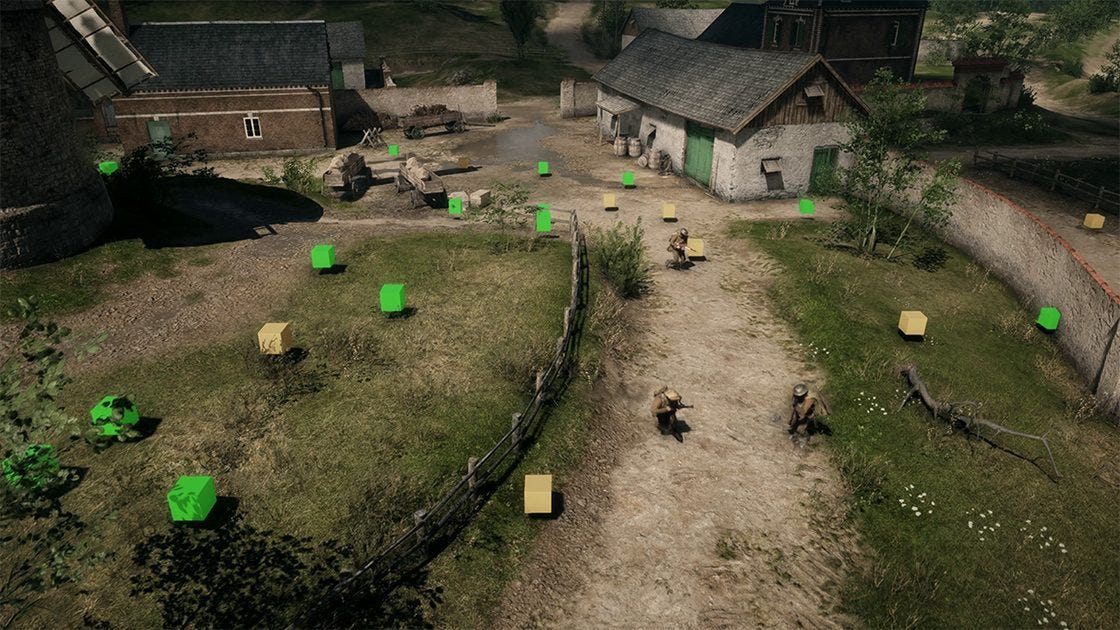
The entire pitch leaned towards those who have invested in generative AI. I suspect their goal was to appeal to AI investors and incentivise them to put their money in games, rather than another large language model provider. Stick it not just into games, but into EA, who lead the conversation on generative AI in game development. They highlighted that they have over 100 AI related projects happening across EA. Which, okay… sure, but what does that mean?
Despite everything, we’re still in the same situation we’ve been in for the past two years. A lot of talks and presentations with speculative tech demos from games companies with no indication it’s going to support development of product. Credit is due to Ubisoft who announced their NEO demo as evidence of how generative AI could be adopted at GDC earlier this year. They at least had the decency to acknowledge this is far from ready to ship. Once again we have lots of speculation and little follow through into something that helps consumers understand what the fuss is all about - and why it’s being repeatedly advocated for as the next big thing in the medium.
It’s worth noting how the tech demos by EA were evocative of existing IPs (Battlefield, EA Sports FC), but neither were part of an upcoming production. Meanwhile, as much as they touted the AI tools of The Sims Hub, there were no dates given for any of it coming out, and far from anything indicative of real-time gameplay. In fact, the only thing to my mind that was discussed in the entire presentation that we know for sure is coming to a game is the FC IQ system in EA Sports FC 25 - and yeah that game is already out.
It’s the same holding pattern we’ve seen before, as company’s are still figuring out how to use this stuff in ways that protect their IP, will not cause problems in development, or big PR snafus in live ops with erroneous or questionable output - that in this case may also affect the reputations of high-profile sports figures. Plus the conversation is becoming even more complex of late, given issues surrounding platform regulations, recent legislation like the EU AI Act, or the ongoing SAG-AFTRA strikes - all of which would impact the adoption of the demos shown in the presentation.
Fun fact, EA are one of the big studios that SAG-AFTRA are currently striking against, as discussed in the previous issue.
If they were serious about being the business leader in generative AI for games, they would be putting it into their games, and there wasn’t any real evidence of that (the FC IQ system is deep learning, not generative). Because much of it simply isn’t ready yet. So to butcher their popular brand line: if it isn’t in the game, they’re not in the game.
A Missed Opportunity
Given EA have done such incredible work in building AI technology for their games, I felt they failed to capitalise on an opportunity to reset the conversation around AI in the entertainment sector.
As I mentioned, across games media the announcement didn’t go down well: another batch of tech demos and flavourful language that means little to the people who you want to play your games. You can only dangle the fruit for so long before it begins to rot, which is what’s souring the public opinion on AI in game development right now. They need to see something that is evocative of how AI is actually going to make their experience more fun, and more interesting. Trying to get Jude Bellingham’s AI avatar to say something controversial is only fun for about 10 minutes, and once they’ve got it to say something silly and post it on TikTok, players will just go back to playing Ultimate Team while you have a PR headache on your hands.
And it’s not just players who need to see this. At a time when studios are downsizing at an astronomical rate, when developers are being made redundant, there is understandably a lot of anxiety about how AI is intersecting with the space - including inside EA. They need to see that a company of this size and magnitude is thinking about how AI impacts their work, and how it impacts their workers.
It struck me that EA should have showcased the work they’re actually shipping in AI, and how that can and will impact future projects. To give some examples:
Doubling down on the AI upscaling pipelines and processes used for the Mass Effect: Legendary Edition for use in other remasters and re-releases of classic EA titles.
Showcasing their AI bot technologies used in everything from Battlefield to Dead Space and how it supports iterative development.
There was a lot of talk about how AI ‘helped’ with the facial scans in EA Sports College Football 25, plus building stadia in their sports game. How can that technology be adopted more broadly?
Highlight developments in AI for animation used across numerous projects (see EA Sports FC’s ‘Hypermotion’) and how it can support different projects.
And of course, really dig down in to the FC IQ system in EA Sports FC, which strikes me as far and away one of the most interesting AI things EA has in their games right now.
These are just hypotheticals, but you know what they all have in common? They’re in the game! They’re all used in actual production, and support game developers in doing their jobs. Also none of them use generative AI to my knowledge, and it would have been a great opportunity to highlight that games are a great space for investing in AI as a whole, not just trying to jump on the generative bandwagon.
Of course this was an investor presentation, and so the obvious argument is that they don’t need to cater to the general gaming populace, or their own employees, with this kind of presentation. But a company of this magnitude would be naïve at best or arrogant at worst in not acknowledging what’s happening here - which all the gaming press and content creator reactions subsequently proves.
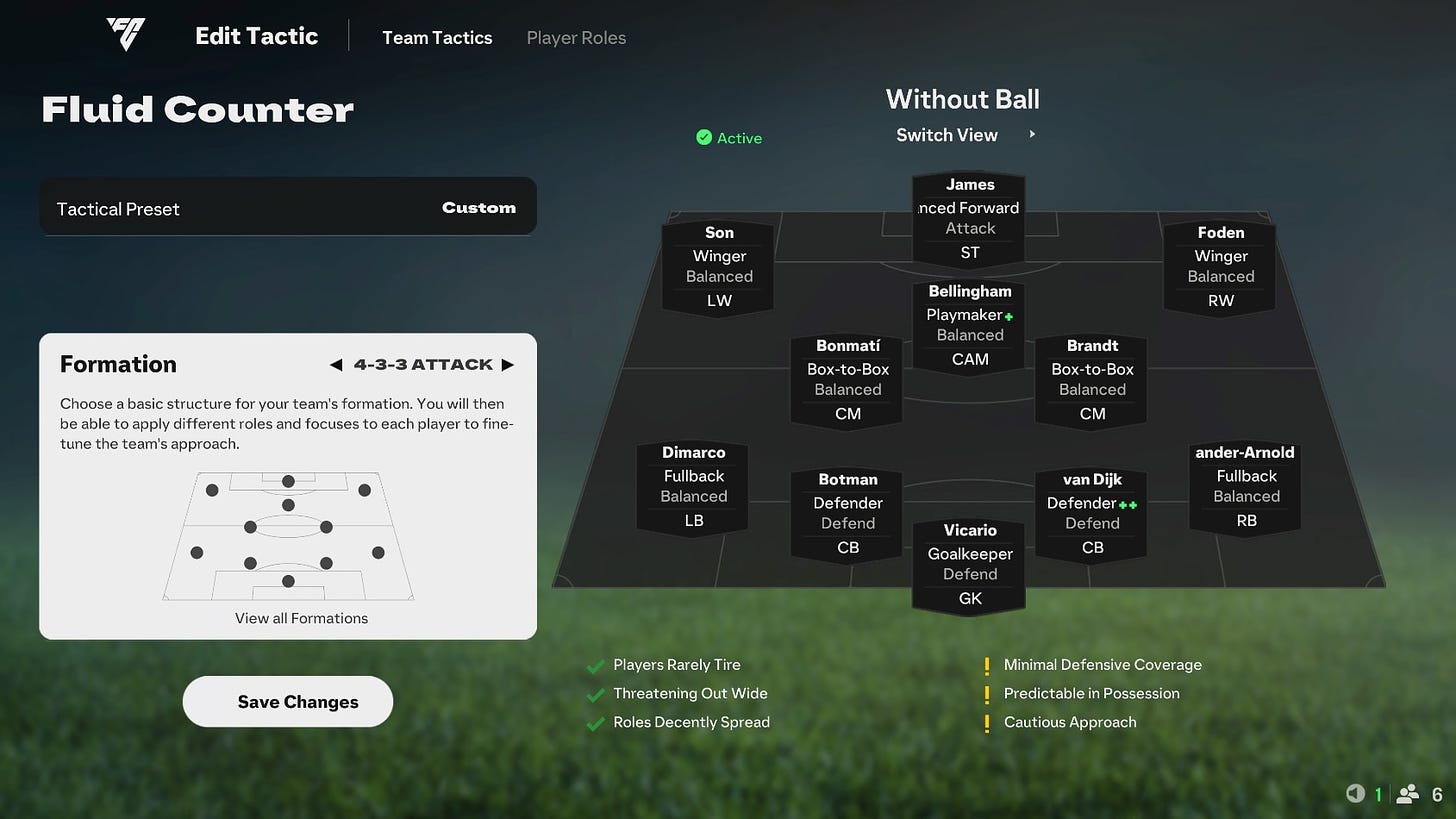
Forward-Looking Statements
As I said, I always think these things are worth taking with a pinch of salt. But the real important thing to take away from this, is how little any of this really means. To suggest that this is reflective of the future of Electronic Arts is generous at best. Why? Well we got to go back again to that key line that Wilson delivered:
“This remarkable technology is not merely a buzzword for us, it’s the very core of our business.” [emphasis mine]
This isn’t the first time such flavourful language has been adopted to curry favour with investors of a particular tech trend. If we wind the clock back a little bit to September 30th 2021. Business were caught in the thrall of another big business trend, one that was catching the eyes of speculative investors, and games companies were seeking to capitalise on it: Web3, and NFTs. Andrew Wilson had this to say on the technology during an online investor call:
"I think the play to earn or the NFT conversation is still really, really early, and there's a lot of conversation.
And there's at some level, a lot of hype about it. I do think it will be an important part of our -- of the future of our industry on a go-forward basis. But it's still early to kind of figure out how that's going to work. I feel good about our position with respect to that.
As a company, we have been leaders in the creation of digital content that has real collectable value in the embedding of that content as part of live services. What we know about collection over time is the collectability is far more valuable to the collector where the collected item has utility. And I think that in the context of the games that we create and the live services that we offer, collectable digital content is going to play a meaningful part in our future. So still early to tell, but I think we're in a really good position, and you should expect us to kind of think more innovatively and creatively about that on a go-forward basis." [emphasis again, mine]
Now here we are in 2024, and the NFT gaming hype has long since died down, and the number of Web3 games that are building any sort of traction are next to zero. But even a somewhat hesitant Wilson was still quick to declare it as the “the future of our industry” - and there was a project at that time already happening . It is the job of a CEO to appeal to investors, and they will try to appease whichever group with cash in hand interested in the latest tech hype train rumbling through Wall Street. So it’s amusing to me - and not surprising whatsoever - that NFT’s weren’t mentioned once in this years presentation, but AI got all the big moments.

And perhaps more critically, it’s important to realise they don’t know what’s going to come of this. These forward-looking statements made by Wilson and the rest of the presentation team are merely evocative of their desired outcome. For fun, it’s worth reading the section on ‘Forward-Looking Statements’ you can find on the investor day page on EA’s website:
During the course of the presentation, Electronic Arts may make forward-looking statements regarding future events and the future financial performance of the company that are subject to change. Statements including words such as “anticipate,” “believe,” “expect,” “intend,” “estimate,” “plan,” “predict,” “seek,” “goal,” “will,” “may,” “likely,” “should,” “could” (and the negative of any of these terms), “future” and similar expressions also identify forward-looking statements. These forward-looking statements are not guarantees of future performance and reflect management’s current expectations. Our actual results could differ materially from those discussed in the forward-looking statements… We assume no obligation to revise or update any forward-looking statement for any reason, except as required by law.
As a closing point, it’s worth highlighting that the presentation did little to impact their stock price. It’s still sitting at roughly $2 lower than it was this time last month. Though many of the recommendations by analysts suggest to invest, or at least hold onto your existing assets!
Wrapping Up
That wraps things up for this week. Next week, it’s the AI and Games Digest for our premium subscribers! It’s going to be a bit Alien: Isolation week funnily enough. Plus, you can expect to see another Goal State update in the coming days as well.
Thanks again to everyone and I’ll catch you all next week!





